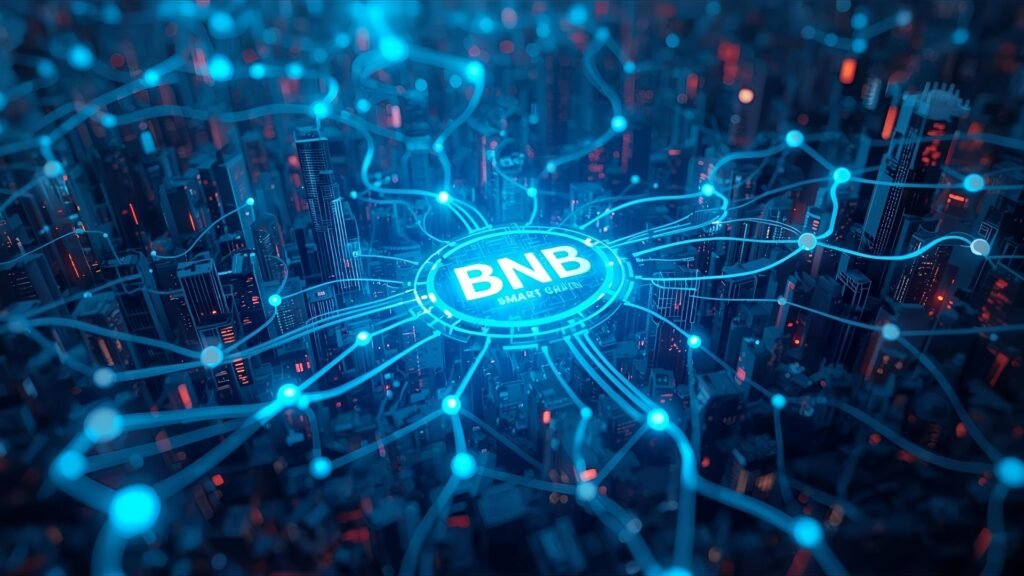BNB Smart Chain emerged as the dominant force in blockchain transaction fees, accumulating an impressive $7.88 million in just 24 hours. This remarkable achievement positions the network ahead of industry giants like Ethereum and Solana, signaling a major transformation in how users interact with decentralized applications and blockchain infrastructure. The surge in network fees typically indicates heightened activity, increased user adoption, and growing confidence in the blockchain’s capabilities to handle complex transactions efficiently.
Understanding the implications of this development requires a deeper examination of what drives network fee generation, how BNB Smart Chain has positioned itself in the competitive blockchain ecosystem, and what this means for investors, developers, and everyday users. Network fees serve as a critical metric for measuring blockchain health, as they directly correlate with transaction volume, smart contract interactions, and overall network utilization. When a blockchain generates substantial fee revenue, it demonstrates real-world utility beyond speculative trading, showcasing genuine demand for its infrastructure and services.
The achievement becomes even more significant when considering the fierce competition among various blockchain networks, each vying for dominance in the rapidly evolving decentralized finance sector. BNB Smart Chain’s ability to generate such substantial fee revenue reflects not just increased transaction counts but also the platform’s success in attracting high-value transactions, complex smart contract deployments, and sustained user engagement across its ecosystem.
Network Fees and Their Significance
Network fees, commonly referred to as gas fees in blockchain terminology, represent the cost users pay to execute transactions and smart contract operations on a blockchain network. These fees serve multiple critical functions within the ecosystem, acting as compensation for validators or miners who process transactions, preventing spam attacks by making malicious activities economically unfeasible, and providing a mechanism for prioritizing transactions during periods of network congestion.
When analyzing blockchain performance and adoption metrics, network fee generation stands as one of the most reliable indicators of actual usage versus mere speculation. Unlike metrics such as total value locked or token price, which can be manipulated or influenced by market sentiment, transaction fees represent real economic activity where users are willing to pay for accessing network services. The willingness of users to consistently pay fees demonstrates confidence in the value proposition offered by the blockchain platform.
For BNB Smart Chain to generate $7.88 million in network fees within a single 24-hour period represents extraordinary activity levels. This volume suggests thousands of transactions ranging from simple token transfers to complex decentralized exchange operations, non-fungible token minting, gaming transactions, and various DeFi protocol interactions. Each transaction contributes to the overall fee pool, creating a substantial revenue stream that benefits the network’s economic model and sustainability.
The significance extends beyond mere numbers, as high fee generation typically correlates with network security, validator profitability, and long-term sustainability. Networks that generate substantial fees create stronger economic incentives for validators to maintain honest behavior, thereby enhancing overall security. Additionally, consistent fee revenue demonstrates that the blockchain has achieved product-market fit, successfully solving real problems for its user base.
BNB Smart Chain’s Architecture and Competitive Advantages
BNB Smart Chain, formerly known as Binance Smart Chain, operates as a high-performance blockchain designed to facilitate fast, low-cost transactions while maintaining compatibility with the Ethereum Virtual Machine. This strategic design decision allows developers to easily port Ethereum-based applications to BNB Smart Chain, leveraging existing tools, libraries, and development frameworks without significant modifications. The dual-chain architecture, working alongside BNB Beacon Chain, enables seamless asset transfers and enhanced flexibility for developers building decentralized applications.
The network employs a Proof of Staked Authority consensus mechanism, utilizing 21 validators who take turns producing blocks in a highly efficient manner. BNB Smart Chain: This approach significantly reduces the time required for transaction finalization compared to traditional Proof of Work systems, enabling BNB Smart Chain to process approximately 160 transactions per second with block times averaging around three seconds. The faster block times and higher throughput capacity directly contribute to improved user experience, particularly crucial for applications requiring rapid transaction confirmation such as decentralized trading platforms and gaming applications.
One of the platform’s most compelling competitive advantages lies in its substantially lower transaction costs compared to Ethereum’s mainnet. While Ethereum users often face gas fees ranging from several dollars to hundreds during periods of network congestion, BNB Smart Chain maintains average transaction costs typically below one dollar. This cost efficiency makes the platform particularly attractive for smaller transactions, retail users, and applications involving frequent micro-transactions that would be economically unviable on more expensive networks.
The ecosystem has flourished with diverse applications spanning DeFi protocols, NFT marketplaces, gaming platforms, and various Web3 innovations. Major projects like PancakeSwap, Venus Protocol, and numerous other decentralized applications have established substantial user bases on BNB Smart Chain, collectively contributing to the network’s impressive fee generation. The platform’s tight integration with the Binance exchange ecosystem provides additional advantages, enabling seamless fiat onramps, extensive trading pair availability, and simplified user onboarding processes.
Analyzing the $7.88 Million Fee Generation
The generation of $7.88 million in network fees within 24 hours represents a multifaceted achievement reflecting various aspects of blockchain health and adoption. Breaking down this figure reveals insights into user behavior, application popularity, and overall ecosystem vitality. High fee generation typically stems from increased transaction volume, complex smart contract interactions requiring more computational resources, and potential network congestion driving up prices through supply-demand dynamics.
Several factors likely contributed to this exceptional performance. First, sustained activity across major DeFi protocols built on BNB Smart Chain creates consistent baseline fee generation. Popular decentralized exchanges like PancakeSwap process millions of dollars in trading volume daily, with each swap generating network fees. Yield farming activities, where users frequently move assets between different protocols to maximize returns, add another layer of transaction activity that accumulates substantial fees over time.
The growing popularity of blockchain gaming and NFT trading on BNB Smart Chain represents another significant contributor. Gaming applications often involve frequent micro-transactions for in-game purchases, character upgrades, and asset transfers. Similarly, NFT marketplaces generate fees through minting, buying, selling, and transferring digital collectibles. The combination of these activities, multiplied across hundreds of active applications, creates a substantial cumulative effect on total network fees.
Market dynamics also play a crucial role in fee generation patterns. During periods of significant price movements in cryptocurrency markets, trading activity intensifies as users rush to capitalize on opportunities or protect their positions. This increased urgency drives higher transaction volumes across decentralized exchanges and lending protocols, naturally resulting in elevated fee generation. Additionally, arbitrage opportunities between different exchanges and trading pairs create automated trading bot activity that contributes to baseline transaction volume.
Comparing this performance against competing blockchains provides important context. While Ethereum typically leads in absolute fee generation due to its larger ecosystem and higher per-transaction costs, BNB Smart Chain’s achievement demonstrates its ability to compete through volume rather than individual transaction fees. Solana, another major competitor known for extremely low fees, generates revenue through massive transaction counts rather than per-transaction costs. BNB Smart Chain’s position suggests it has found an effective middle ground, balancing reasonable fees with substantial throughput.
Implications for the Broader Blockchain Ecosystem
BNB Smart Chain’s dominant fee performance sends ripples throughout the blockchain industry, influencing developer decisions, investment strategies, and competitive dynamics among various platforms. The success demonstrates that users value practical utility and cost-effectiveness over pure decentralization ideals when it comes to everyday blockchain interactions. This pragmatic approach challenges the maximalist narratives that have historically dominated blockchain discourse, showing that different use cases may require different trade-offs in the security-scalability-decentralization trilemma.
For developers considering which blockchain to build upon, such fee generation represents validation of the platform’s viability and sustainability. Building on a chain with strong fee revenue indicates robust user demand, reducing concerns about ghost chains with impressive technical specifications but minimal real-world usage. The substantial transaction volume also ensures better liquidity for tokens launched on the platform, more potential users to monetize, and a vibrant ecosystem of complementary applications to integrate with.
Investors and token holders benefit from understanding these dynamics as network fees often correlate with the underlying value of the blockchain’s native token. While the BNB token price depends on numerous factors, consistent fee generation demonstrates fundamental utility beyond speculation. Some blockchain economic models include fee-burning mechanisms or redistribution to token stakers, creating direct value accrual to token holders from network activity. Even without such mechanisms, high fees indicate strong demand for blockspace, which typically supports token value over longer timeframes.
The competitive landscape continues evolving as various Layer 1 and Layer 2 solutions vie for developer mindshare and user adoption. Ethereum’s ongoing upgrades aim to reduce fees and increase throughput through Layer 2 scaling solutions and eventual sharding implementation. Alternative Layer 1 chains like Solana, Avalanche, and newer entrants promise different combinations of speed, cost, and decentralization. BNB Smart Chain’s sustained success amid this competition validates its approach and demonstrates that early ecosystem development and strategic partnerships can create durable advantages.
Future Outlook and Growth Potential
Looking ahead, several factors will influence whether BNB Smart Chain can maintain its position as a fee-generating leader. The continued growth of decentralized applications built on the platform remains paramount, as application diversity drives user retention and creates network effects that make the ecosystem more valuable over time. Encouraging innovation across gaming, DeFi, social applications, and enterprise use cases will be crucial for sustaining transaction growth rates.
Technical developments and infrastructure improvements also play vital roles in determining long-term competitiveness. As transaction volumes increase, maintaining network stability, security, and performance becomes progressively challenging. Investment in validator infrastructure, network optimization, and developer tooling will be essential for accommodating future growth without compromising user experience. Additionally, exploring Layer 2 scaling solutions specific to BNB Smart Chain could enable even greater throughput while maintaining the security guarantees of the base layer.
Regulatory developments represent both challenges and opportunities for the ecosystem. As governments worldwide develop frameworks for cryptocurrency and blockchain regulation, platforms with strong compliance infrastructure and transparent governance may gain advantages. BNB Smart Chain’s association with Binance, a major regulated exchange in multiple jurisdictions, provides both legitimacy and potential regulatory scrutiny. Navigating this landscape successfully will require balancing innovation with compliance, ensuring the platform remains accessible to global users while meeting evolving regulatory requirements.
The broader adoption of blockchain technology by mainstream users and enterprises could dramatically expand the addressable market for all chains, including BNB Smart Chain. As more individuals and businesses recognize blockchain’s utility for payments, supply chain tracking, identity management, and various other applications, platforms offering the best combination of cost, speed, and developer support will capture disproportionate market share. BNB Smart Chain’s proven ability to handle high transaction volumes at reasonable costs positions it favorably for these emerging use cases.
Competition will undoubtedly intensify as other blockchains continue improving their technology and expanding their ecosystems. Ethereum’s transition to Proof of Stake and ongoing scaling improvements aim to reclaim users who migrated to alternative chains due to high fees. Newer platforms launching with cutting-edge technology and substantial venture capital backing will attempt to leapfrog existing solutions. Maintaining leadership will require continuous innovation, strategic partnerships, and unwavering focus on user needs rather than resting on current achievements.
Conclusion
BNB Smart Chain’s achievement of generating $7.88 million in network fees within 24 hours represents a significant milestone in the blockchain industry, demonstrating the platform’s maturity, user adoption, and practical utility. This performance surpassing major competitors like Ethereum and Solana validates the network’s strategic positioning as a cost-effective, high-throughput alternative for decentralized applications. The substantial fee generation reflects genuine economic activity across diverse use cases, from DeFi protocols and NFT marketplaces to gaming applications and beyond.
The implications extend far beyond simple bragging rights, as consistent fee revenue indicates fundamental network health, sustainability, and value creation for ecosystem participants. For developers, the active user base and transaction volume provide confidence in building on the platform. For users, the vibrant ecosystem offers diverse applications and services accessible at reasonable costs. For investors, the metrics demonstrate real-world utility supporting long-term value propositions.
As the blockchain industry continues evolving, platforms that successfully balance scalability, cost-efficiency, and security while fostering vibrant developer ecosystems will likely emerge as lasting winners. BNB Smart Chain’s current performance suggests it has achieved this balance, though maintaining leadership will require ongoing innovation and adaptation to changing market conditions. The coming months and years will reveal whether this fee generation represents a temporary spike or the beginning of sustained dominance in the competitive blockchain landscape.
FAQs
Q: What are network fees, and why do they matter for blockchain performance?
Network fees, also called gas fees, are costs users pay for processing transactions and smart contract executions on blockchain networks. They matter because high fee generation indicates genuine network usage, demonstrates economic sustainability.
Q: How does BNB Smart Chain maintain lower fees than Ethereum while processing high transaction volumes?
BNB Smart Chain achieves lower fees through its Proof of Staked Authority consensus mechanism using 21 validators instead of thousands of nodes, enabling faster block times and higher throughput. The network processes approximately 160 transactions per second with three-second block times, creating more available blockspace relative to demand.
Q: What types of applications drive the most fee generation on BNB Smart Chain?
Decentralized exchanges like PancakeSwap generate substantial fees through high-frequency trading activity and liquidity provision. DeFi lending protocols, yield farming platforms, and automated market makers contribute significantly through complex smart contract interactions.
Q: Can BNB Smart Chain sustain this level of fee generation long-term?
Sustainability depends on continued ecosystem growth, maintaining technical performance as transaction volumes increase, and successfully competing against evolving alternatives. The platform’s established developer community, strong DeFi ecosystem, and cost advantages provide solid foundations for sustained activity.
Q: How does high network fee generation benefit BNB token holders?
High fee generation demonstrates fundamental utility and demand for the network, which typically supports token value over time. BNB Smart Chain implements a fee-burning mechanism where a portion of collected fees is permanently removed from circulation, creating deflationary pressure that can benefit holders.



